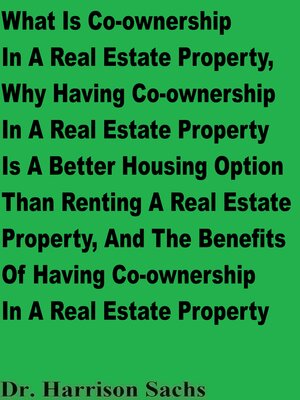What Is Co-ownership In a Real Estate Property, Why Having Co-ownership In a Real Estate Property Is a Better Housing Option Than Renting a Real Estate Property, and the...
audiobook (Unabridged)
By Dr. Harrison Sachs

Sign up to save your library
With an OverDrive account, you can save your favorite libraries for at-a-glance information about availability. Find out more about OverDrive accounts.
Find this title in Libby, the library reading app by OverDrive.



Search for a digital library with this title
Title found at these libraries:
| Library Name | Distance |
|---|---|
| Loading... |
This audiobook is narrated by a digital voice.
This essay sheds light on what is co-ownership in a real estate property, demystifies why co-ownership in a real estate property is a better housing option to renting a real estate property, and delineates the benefits of having co-ownership in a real estate property. Succinctly stated, co-ownership in a real estate property entails owning a partial equity stake in a real estate property. When you own a partial equity stake in a real estate property, it then denotes that you own the real estate property alongside other people who also have a partial equity stake in the real estate property. Furthermore, when you own a partial equity stake in a real estate property, it then also denotes that you do not fully own the real estate property that you have a partial equity stake in. Even though having co-ownership in a real estate property is not tantamount to having a full equity stake in a real estate property, it nonetheless provides an alternative housing option to renting an apartment, a stick-built home, a modular home, or a lot for a manufactured home in a mobile home park. Having co-ownership in a real estate property can render it less cumbersome for a person to performance grounds maintenance on a real estate property if it culminates in the co-owners of a real estate property divvying up real estate property grounds maintenance responsibilities among themselves. Moreover, having co-ownership in a real estate property can also render it less expensive for a person to pay for recurring utility costs it culminates in the co-owners of a real estate property divvying up the recurring utility costs among themselves. In the context in which a real estate property is located in a homeowners association community, then having co-ownership in a real estate property can also render it less expensive for a person to pay the homeowners association fees if it culminates in the co-owners of a real estate property.







